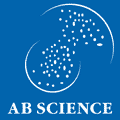AB8939 is a new small-molecule drug that binds to tubulin and induces a rapid destabilisation of microtubules. Through disorganisation of microtubules, AB8939 is able to induce the apoptosis at nanomolar concentration of a wide panel of tumor cell lines, in particular hematopoietic tumor cell lines (i.e. cancers that affect the blood and lymph system) and in patient blasts.
AB8939 shows a strong dose-dependent anti-leukemia activity and efficacy in resistant-doxorubicin and cytarabine models overcoming multidrug resistance.

Anti-proliferative activity of AB8939 compared to doxorubicin
In particular, AB8939 is efficient in killing doxorubicin-resistant cell line (MES-SA/Dx5) that overexpress glycoprotein (Pgp/MDR1).
Furthermore, AB8939 increases the survival of animals in acute myeloid leukemia model. AB8939 displays an anti-leukemic activity in this AML mouse model (AMKL26 model), as evidenced by the eradication of the blasts in the bone marrow in mice treated with AB8939.

Bone marrow blasts eradication in acute megakaryoblastic leukemia patient-derived xenograft mouse model
Safety pharmacology studies performed indicate no effects on the CNS, respiratory and cardiovascular system
The chemical structure and binding sites of AB8939 are different from the well-known antimicrotubules agents. As such, compound AB8939 offers a potential new route of treatment for diseases related to cell proliferation.
The aim of AB Science with compound AB8939 has been to design an ultra-selective small-molecule drug, having strong antiproliferative properties and an acceptable safety profile with minimal cardiac or neuronal toxicity.
The compound is entirely owned by AB Science and is brought forward into formal development as part of a strategy to bring potent and selective compounds from the Company’s proprietary drug discovery technology, through clinical development and into commercialization.
AB Science is planning a first in human clinical trial of AB8939 to investigate its tolerability and efficacy in patients with acute myeloid leukemia in second or third-line treatment and who are unfit to receive intensive chemotherapy. In patients unfit for intensive salvage chemotherapy, effective treatment options are lacking with typical complete response rates of just 20% and median overall survival of about 8 months.
Patients
If you wish to participate in this study, please contact us at the following address:
clinical@ab-science.com




